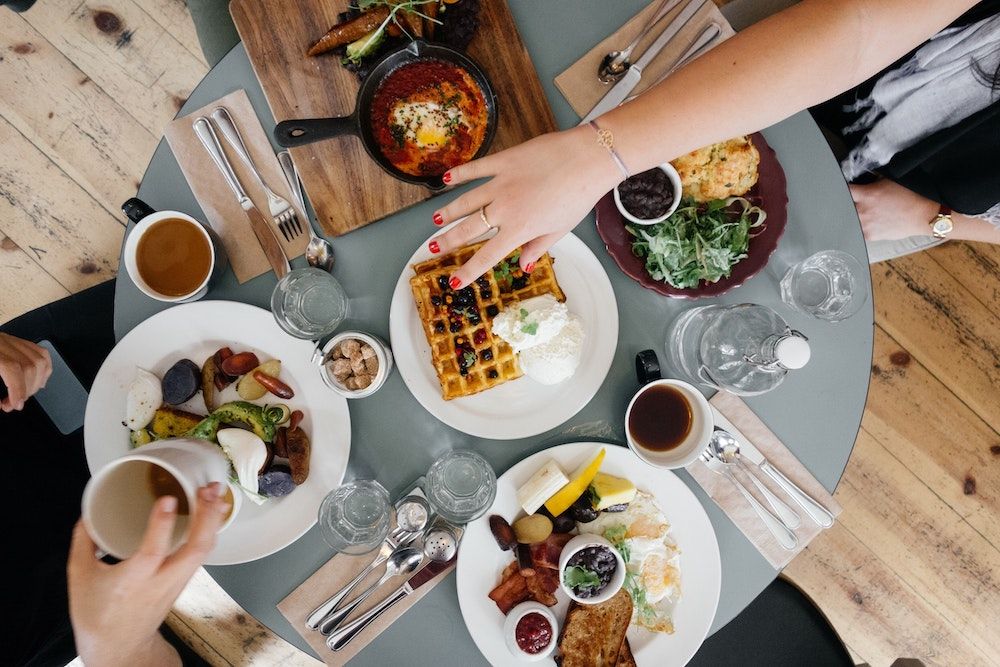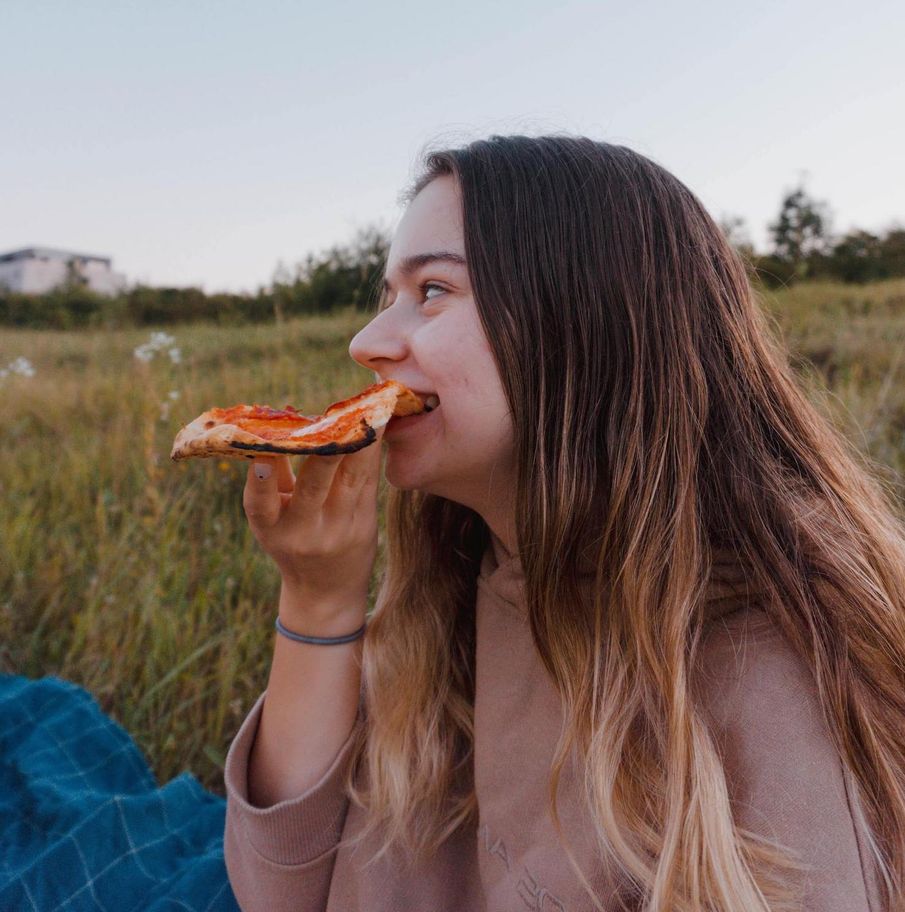If you’re ready to ditch food guilt and rediscover the joy of meal times, why not practise intuitive eating?
If I went back and told teenage me that one day I would be able to eat whatever I wanted without guilt… I think she’d laugh in my face. Back then, I was struggling with an eating disorder, and my relationship with food was restrictive in every sense of the word.
What I ate (or didn’t eat) consumed every waking moment, with mealtimes fraught with tension and internal battles. In time, I got the professional help I needed to recover but, even then, the way that I ate was bound by rules.
These rules are set by diet culture and they’re ones I’m sure you’ll be familiar with – some foods are ‘good’, others ‘bad’, and many, downright ‘naughty’. We’re told that if we want to be healthy’ (i.e. thin), then we have to eat a certain way, considering how every morsel that passes our lips will affect us.
Gradually, however, I became exposed to another way of thinking. I started following body positivity advocates online and learned about concepts such as intuitive eating, and health at every size (HAES). Over time, I started adopting intuitive eating practises, rebuilding trust with myself, and discovering a freedom I never thought was possible.
Intuitive eating is a weight-inclusive, non-diet approach to eating. Its 10 principles include rejecting the diet mentality, making peace with food, feeling your fullness, and honouring your health through gentle nutrition. The idea is to start tuning-in to your body’s signals, recognising when you’re hungry, when you’re full, and how food makes you feel, both physically and emotionally.
Following this approach means I eat what I want, and am able to embrace the unbridled joy that comes with it. I no longer agonise over how much to eat, or worry that what I’m eating is ‘bad’.
If I had to describe it, I would say it’s like taking off restraints after a lifetime of being tied up. At first, the freedom can feel unnerving (if I can eat what I want, surely I’ll go to an extreme and eat chocolate all day?), but in time you learn that you can trust yourself, and eventually you find your footing.
Shifting your mindset around eating isn’t an easy or quick thing to do, especially when contending with a beast like diet culture, but it can be done.

Taking the first steps
Before we move forwards, it’s helpful to look back so we can meet ourselves where we are. Nutritionist and intuitive eating counsellor Hattie Rees explains that intuitive eating is a journey of self-discovery, and this includes exploring your past relationship with food.
“You can start this by sitting down and drawing a timeline based around your relationship with food,” Hattie says. “Get curious with yourself, and try to pinpoint things such as the age you first went on a diet, and the age you were first negatively affected by your body image. What environment did you grow up in? Did your family/caregivers have a strong history of dieting? What about at school or in the workplace?
“You may have been waist-deep in diet culture for decades, it may take a while to unravel and unlearn everything you’ve picked up from it. This is OK – remember to have compassion for yourself.”
When we’re young, we’re malleable. We often take in the messaging surrounding us and it becomes a part of us, for better or worse. This makes it very easy for diet culture to feel normal, and the fact it is still very much accepted in society today makes it even more difficult to let go of.
Taking some time to recognise that, and to give yourself grace is important here. Something that can really help at this stage is detaching ourselves (as much as possible) from diet culture.
Detaching from diet culture
“We can’t fully control what is in our environment – let’s face it, diet culture is everywhere,” Hattie notes. But, a helpful step is to look at the environments you can control, and ‘cleanse’ them from diet culture rhetoric.
“For example, have a social media detox and unfollow anybody who is preaching diet culture, and/or who makes you feel rubbish. Start following people who are in the anti-diet space: personal trainers, therapists, and nutritionists such as myself @hattiereeshealth who put out regular anti-diet content.”
Hattie also suggests making a list of every diet you’ve done, how they’ve made you feel, and how much money you’ve spent on them.
“Remember those feelings of restriction when on a diet, and that those diet companies are banking on each diet failing so that you’ll keep spending money with them,” Hattie notes. “Remind yourself of your brain on a diet vs not on a diet – how much mental room do you have in your life for other things when not focused on food?”
Remembering the lack of headspace when in a dieting mentality is something I come back to time and time again. When you find freedom from diet culture, your world expands.
Getting support
If you are starting from a place of disordered eating, it can really help to get some professional support. I don’t believe I would have been able to make the mindset shift without first receiving treatment for my eating disorder. Mental health professionals can support you at this point, bringing you closer to a healthy relationship with food, but nutrition professionals can also be a source of support.
“To work on intuitive eating, look for someone who is a Certified Intuitive Eating Counsellor, like myself, which means they have been officially trained by the founders of intuitive eating,” Hattie says.
“We all offer slightly different things, such as one-to-one coaching, online courses, group coaching, and online support groups. There is so much out there to suit whatever you need.
“The main thing when looking for support is to find somebody who you gel with. Intuitive eating can be a challenging process, so it can be nice to know you have a professional by your side, supporting you every step of the way, or the support of a community with like-minded people.”
Two areas that are commonly present for those of us seeking support are negative body image and emotional eating, so getting support for those areas, Hattie notes, is vital for this work.
Whatever your starting point is, there is a path to intuitive eating. It may not be straightforward, and you may need some help along the way, but if you keep putting one foot in front of the other, you will get there. And when you do get there, take a minute to stop and appreciate the view… because I can tell you, it’s pretty fantastic.
Start your unlearning with these book recommendations from Hattie:
1. Intuitive Eating by Evelyn Tribole and Elyse Resch (you can also buy the workbook to follow)
2. Just Eat It by Laura Thomas PhD
3. Anti-Diet by Christy Harrison
Learn more about Hattie's work and find professional support on nutritionist-resource.org.uk


Comments